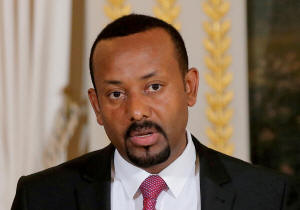Ethiopia's PM relishes victory, but Tigrayan leader says war not over
 Send a link to a friend
Send a link to a friend
 [November 30, 2020]
ADDIS ABABA/NAIROBI (Reuters) -
Ethiopia's Prime Minister Abiy Ahmed lauded his soldiers on Monday for
victory over a rebellious northern movement, but the leader of Tigray's
forces said they were still fighting amid fears of a protracted
guerrilla conflict. [November 30, 2020]
ADDIS ABABA/NAIROBI (Reuters) -
Ethiopia's Prime Minister Abiy Ahmed lauded his soldiers on Monday for
victory over a rebellious northern movement, but the leader of Tigray's
forces said they were still fighting amid fears of a protracted
guerrilla conflict.
The nearly month-long war has killed hundreds and probably thousands,
sent refugees into Sudan, enmeshed Eritrea, affected a peacekeeping
mission in Somalia, and deepened divisions between Ethiopia's myriad
ethnic groups.
Abiy's troops took Tigray's capital Mekelle at the weekend and declared
defeat for the Tigray People's Liberation Front (TPLF), a guerrilla
movement-turned-political party that dominated national government for
nearly three decades until 2018.
"Our constitution was attacked but it didn't take us three years, it
took us three weeks," Abiy told parliament, comparing his offensive with
the American Civil War of the 1860s.

"Our army is disciplined and victorious," he added, saying federal
troops had not killed any civilians nor damaged Mekelle after launching
a Nov. 4 offensive in response to a TPLF attack on an army base.
Drones were used to watch the TPLF, but federal forces declined to fire
rockets in Tigray, Abiy said. "Even though we have better capacity, we
won't use it. We are not the junta ... We conduct ourselves
responsibly."
'FIGHTING THE INVADERS'
Though the highland city of 500,000 people fell with little resistance,
the TPLF later said it had shot down a plane, retaken one town, and was
resisting.
TPLF leader Debretsion Gebremichael, a 57-year-old former radio
operator, denied reports that he had fled to South Sudan and said his
forces had captured some soldiers from neighbouring Eritrea around Wukro,
about 50 km (30 miles) north of Mekelle.
"I'm close to Mekelle in Tigray fighting the invaders," Debretsion
Gebremichael told Reuters in a text message.
Claims from all sides are difficult to verify since phone and internet
links to Tigray have largely been down and access has been tightly
controlled since the war began.
There was no comment from the Eritrean government, though at the start
of the war it denied involvement.
The TPLF has shelled Asmara airport and accused Eritrea of sending
troops over the border to fight with Abiy's forces, but Eritrea's
foreign minister denied any role in a Nov. 10 interview.
When he took office in 2018, Abiy pledged to unite Ethiopia's 115
million people, but there have been repeated bouts of ethnic bloodshed
and hundreds of thousands have had to flee their homes due to those
clashes.
In Tigray, both sides have spoken of hundreds of dead in the Tigray war,
and diplomats believe the toll is in the thousands. Tens of thousands
more have been uprooted from their homes.
[to top of second column]
|

Ethiopian Prime Minister Abiy Ahmed speaks during a media conference
at the Elysee Palace in Paris, France, October 29, 2018. Michel
Euler/Pool via REUTER

'CRIMINAL CLIQUE'
Abiy's spokeswoman Billene Seyoum dismissed the TPLF's comments
about still fighting, saying: "Tracking and responding to the many
delusions of a disintegrating criminal clique that has become
irrelevant is not our focus."
But Debretsion's defiance raises the spectre of a drawn-out
insurgency. The battle-hardened TPLF helped to topple Ethiopia's
Marxist dictatorship in 1991 and knows how to exploit its
mountainous terrain and borders with Sudan and Eritrea.
"Although it's not clear how depleted Tigrayan security forces are
by the conflict, armed resistance to federal rule may well be backed
by much of the regional government and party apparatus, including
local militia, as well as by other Tigrayan nationalist elements,"
said International Crisis Group analyst Will Davison.
Abiy won a Nobel Peace Prize last year for making peace with
Eritrea, whose government also regards the TPLF as a foe.
Abiy, whose parents are from the larger Oromo and Amharic groups,
said that when he took office he felt like a "prisoner" and was
uncomfortable flying around the nation which operates as a
federation of 10 regions run by separate ethnic groups.
In total, there are more than 80 ethnicities in Ethiopia, Africa's
second most populous nation.
During his rule, Tigrayans in senior military positions had been
reduced to a quarter from 60% of the top brass, Abiy said, adding:
"We must build an army that looks like the country."

Ethiopia's military is also a major contributor to an African Union
peacekeeping force fighting al Qaeda-linked militants in Somalia,
but has disarmed several hundred soldiers there of Tigrayan
ethnicity, questioning their loyalty.
(Reporting by Addis Ababa newsroom, and Duncan Miriri and David
Lewis in Nairobi; Writing by Andrew Cawthorne; Editing by William
Maclean and Jon Boyle)
[© 2020 Thomson Reuters. All rights
reserved.] Copyright 2020 Reuters. All rights reserved. This material may not be published,
broadcast, rewritten or redistributed.
Thompson Reuters is solely responsible for this content. |